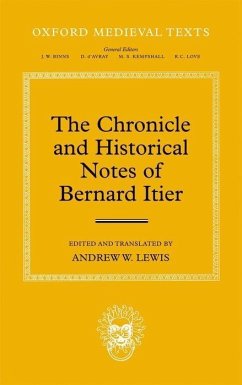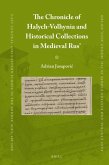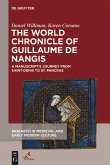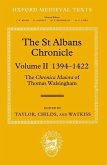Bernard Itier (1163-1225) was head librarian of the monastery of Saint-Martial at Limoges. As such he had free access to the books and made notations in many of them. The largest collection of these notes comprises his chronicle: a history of the world from Creation until his own time which, in part to conserve parchment, Bernard entered in the margins of two earlier codices he had appropriated for the purpose.
The work includes a 'retrospective' section, relative to the past, and a 'contemporaneous' section, similar to a journal, in which Bernard recorded current or recent events which struck his interest. His record is highly idiosyncratic, reflecting the priorities of a monk who viewed the world from, and largely in relation to, his monastery. Accordingly, despite what modern historians consider to have been momentous changes in the kingdoms and the church at the time, what most interested Bernard
were the affairs of his abbey, local events, miracles or other prodigies, and instances of atypical violence. In his outlook, the kings and pope were outsiders, and sometimes threatening. He does not mention the conquests of Philip Augustus, and records with almost palpable relief the death of
Innocent III, who he had feared would impose an unwelcome choice of abbot on his monastery.
Andrew Lewis provides, in Bernard's Latin and in English translation, the only complete text of Bernard's chronicle ever published, and the fullest edition of his historical notes from other manuscripts which complement the chronicle.
Hinweis: Dieser Artikel kann nur an eine deutsche Lieferadresse ausgeliefert werden.
The work includes a 'retrospective' section, relative to the past, and a 'contemporaneous' section, similar to a journal, in which Bernard recorded current or recent events which struck his interest. His record is highly idiosyncratic, reflecting the priorities of a monk who viewed the world from, and largely in relation to, his monastery. Accordingly, despite what modern historians consider to have been momentous changes in the kingdoms and the church at the time, what most interested Bernard
were the affairs of his abbey, local events, miracles or other prodigies, and instances of atypical violence. In his outlook, the kings and pope were outsiders, and sometimes threatening. He does not mention the conquests of Philip Augustus, and records with almost palpable relief the death of
Innocent III, who he had feared would impose an unwelcome choice of abbot on his monastery.
Andrew Lewis provides, in Bernard's Latin and in English translation, the only complete text of Bernard's chronicle ever published, and the fullest edition of his historical notes from other manuscripts which complement the chronicle.
Hinweis: Dieser Artikel kann nur an eine deutsche Lieferadresse ausgeliefert werden.








